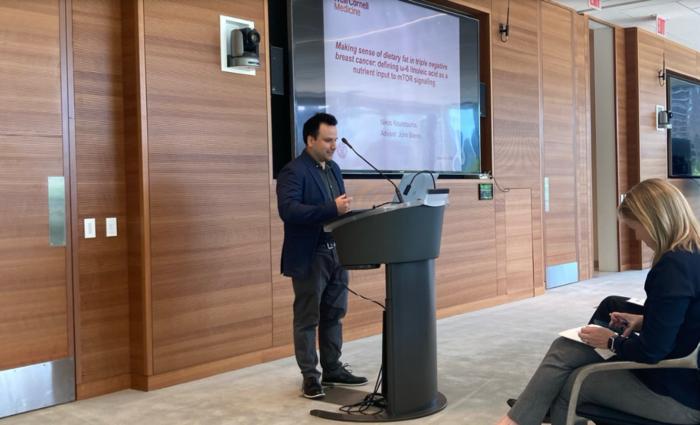
Dr. Nikolaos Koundouros, a postdoctoral associate in the Department of Pharmacology at Weill Cornell Medicine, has been honored with the prestigious 2025 Tri-Institutional Breakout Award for Junior Investigators. This accolade, jointly presented by Weill Cornell Medicine, Memorial Sloan Kettering Cancer Center, and The Rockefeller University, recognizes up to six outstanding early-career scientists annually, selected for their groundbreaking work, impactful discoveries, and promising trajectory toward independent research leadership. Recipients of this award receive an unrestricted $25,000 prize designed to support innovative scientific inquiry.
Dr. Koundouros’s research probes a complex and increasingly relevant crossroads between nutrition, metabolism, and cancer biology. His investigations delve deep into the cellular mechanisms that govern how cells sense and metabolize dietary nutrients, focusing particularly on polyunsaturated fatty acids such as omega-6 and omega-3. Operating within Dr. John Blenis’s lab, the Anna-Maria and Stephen Kellen Professorship in Cancer Research at Weill Cornell, Koundouros’s projects explore how these fats modulate molecular pathways that can either promote or suppress tumorigenesis, with a keen eye on breast cancer — specifically, the notoriously aggressive triple-negative breast cancer (TNBC) subtype.
A cornerstone of Dr. Koundouros’s scientific journey was his doctoral research at the Institute of Cancer Research in London, where he contributed to pioneering the iKnife technology. This novel surgical device employs real-time tissue chemistry analysis to detect cancerous tissue during operations, enhancing precision and patient outcomes. Building on this foundation, Koundouros has applied sophisticated metabolomic and lipidomic techniques to unravel how breast cancer cells metabolize nutrients differently, revealing vulnerabilities that may serve as therapeutic targets.
.adsslot_toEAkxiZSc{width:728px !important;height:90px !important;}
@media(max-width:1199px){ .adsslot_toEAkxiZSc{width:468px !important;height:60px !important;}
}
@media(max-width:767px){ .adsslot_toEAkxiZSc{width:320px !important;height:50px !important;}
}
ADVERTISEMENT
The lab’s signature finding, recently published in the renowned journal Science, illuminates a distinct molecular mechanism linking linoleic acid — an abundant omega-6 fatty acid predominantly found in seed oils and the Western diet — to enhanced tumor growth in triple-negative breast cancer. This lipid-driven promotion of malignancy occurs through activation of the fatty acid binding protein 5 (FABP5) and the mechanistic target of rapamycin complex 1 (mTORC1) signaling pathway, specific to TNBC cells. This discovery marks a critical advance in understanding how dietary components can influence cancer biology at a molecular level, highlighting patient diet as a modifiable factor with potential therapeutic implications.
What sets this research apart is its integration of nutritional science with cutting-edge molecular oncology, bridging gaps that have long persisted between these fields. Dr. Koundouros emphasizes the transformative potential of this integrative approach—suggesting that tailored dietary interventions could complement current treatment paradigms for breast cancer, especially for subtypes lacking effective targeted therapies. By identifying biomarkers like FABP5, this work also opens avenues for precision nutrition strategies that personalize cancer care based on molecular profiles and metabolic vulnerabilities.
The broader implications of Dr. Koundouros’s research resonate well beyond oncology. His ongoing investigations into how omega-3 fatty acids—the so-called “good fats”—affect the metabolic landscape hold promise for unraveling new pathways involved not only in cancer but also in aging-related metabolic diseases such as obesity and type 2 diabetes. This comprehensive vision seeks to exploit the metabolic plasticity of cells to restore healthy physiology and improve therapeutic responses across a spectrum of chronic diseases.
Throughout his postdoctoral work, Dr. Koundouros has been characterized by his relentless curiosity and meticulous approach to scientific challenges, traits lauded by mentors and colleagues alike. Dr. Blenis highlights Koundouros’s unique ability to integrate biochemical, molecular, and clinical insights, accelerating discovery in the realm of lipid metabolism and disease. The collaborative synergy between the laboratory team and clinical experts, including Dr. Eleni Andreopoulou, has been pivotal in translating laboratory findings into clinically meaningful hypotheses, underscoring the essential role of interdisciplinary research in contemporary biomedical science.
The Tri-Institutional Breakout Award not only recognizes Dr. Koundouros’s past achievements but also provides critical seed funding to propel his ambitious plans for future work. He envisions a research trajectory that further deciphers how cellular nutrient sensing mechanisms orchestrate the pathophysiology of chronic illnesses. Central to this effort is the hope that dietary modulation, combined with novel pharmacological interventions, can substantially improve patient outcomes and quality of life, particularly in diseases where metabolic dysregulation is a core driver.
On June 2, Dr. Koundouros formally received his award alongside fellow recipients Dr. Veena Padmanaban from The Rockefeller University and Dr. Keunwoo Ryu of Memorial Sloan Kettering Cancer Center during the Tri-Institutional Breakout Prize Symposium hosted at The Rockefeller University. This event served as a platform to celebrate emerging leaders in biomedical research and to foster collaborations that may accelerate scientific innovation across institutions.
Dr. Koundouros’s story embodies a new wave of translational science that merges molecular detail with holistic patient care perspectives. His pioneering insights into the role of dietary lipids in aggressive breast cancer subtypes challenge conventional paradigms and offer fresh hope for integrative, patient-centered approaches to therapy. By elucidating how common nutritional elements such as linoleic acid can directly stimulate tumor progression, his work invites a reexamination of diet’s role in cancer management and the potential to leverage metabolic pathways as both biomarkers and therapeutic targets.
As cancer rates related to lifestyle and diet continue to climb globally, research such as Dr. Koundouros’s is crucial in bridging basic science discoveries with public health strategies. The potential to influence dietary guidelines, develop novel diagnostic tools, and refine treatment regimens through metabolic intervention represents a paradigm shift with profound clinical implications. His work underscores the necessity for continued investment in junior investigators who are uniquely positioned to push the boundaries of biomedical research and improve human health on multiple fronts.
With a clear blend of innovative technology, molecular biology, and clinical relevance, Dr. Nikolaos Koundouros’s contributions exemplify the forefront of cancer research today. The fusion of dietary science and oncology not only advances our understanding of disease progression but also paves the way toward more personalized, effective therapeutic approaches, potentially transforming how cancer and chronic diseases are treated in the 21st century.
Subject of Research: Molecular mechanisms linking dietary fatty acids to breast cancer progression, with a focus on triple-negative breast cancer and metabolic disease
Article Title: Not specified
News Publication Date: Not specified
Web References:
https://vivo.weill.cornell.edu/display/cwid-nik4009
https://meyercancer.weill.cornell.edu/
https://www.science.org/doi/10.1126/science.adm9805
https://news.weill.cornell.edu/news/2025/04/omega-6-fatty-acid-promotes-the-growth-of-an-aggressive-type-of-breast-cancer
Image Credits: Weill Cornell Medicine
Keywords: Cancer research, Pharmacology, Cancer, Breast cancer
Tags: 2025 Tri-Institutional Breakout Awardcancer biology investigationscancer research and nutritionDr. Nikolaos Koundourosearly-career scientistsinnovative scientific inquiry fundingmetabolic processes in cancermolecular pathways in tumorigenesispolyunsaturated fatty acids and cancerpostdoctoral research in pharmacologytriple-negative breast cancer researchWeill Cornell Medicine



